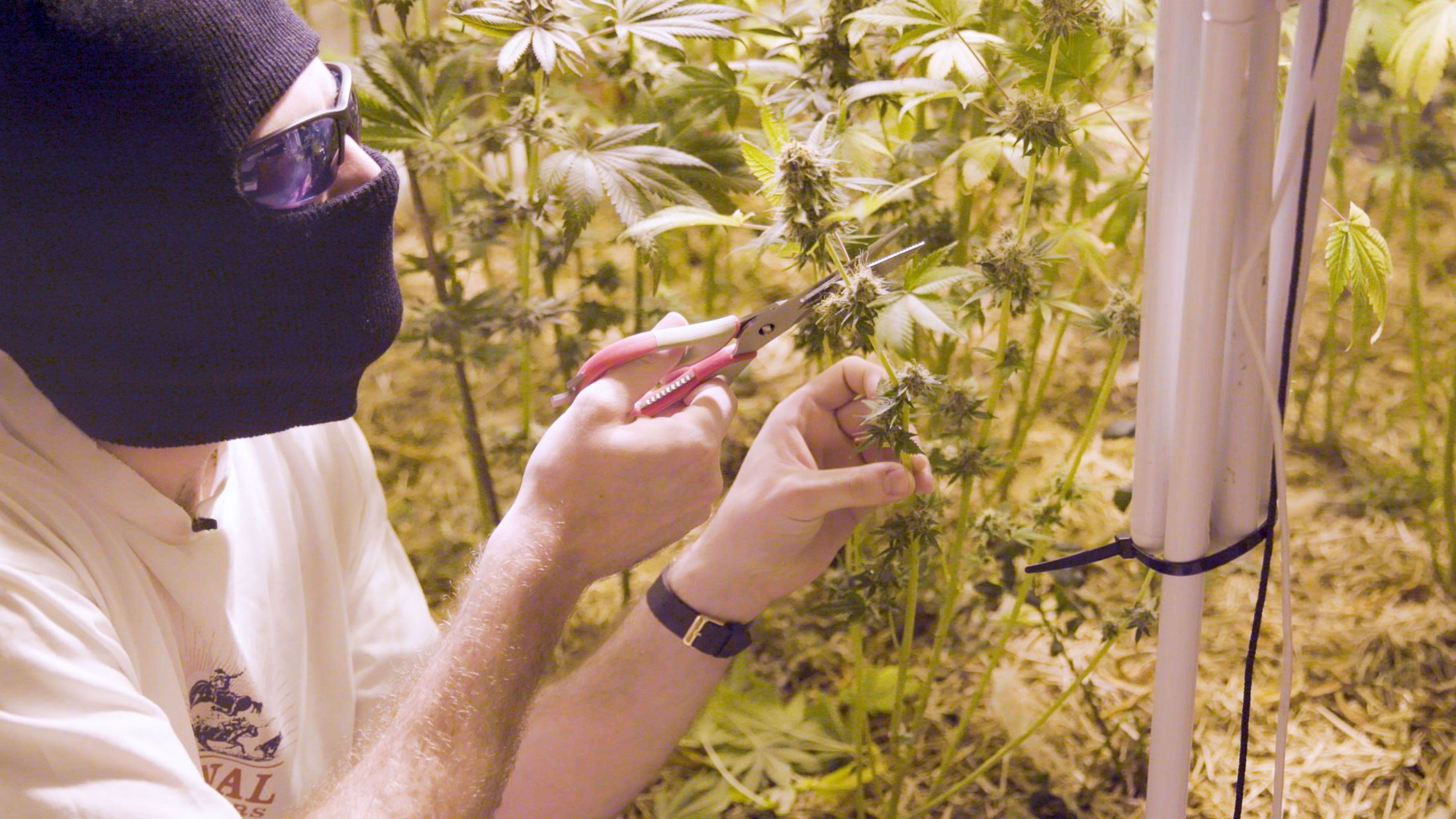This article is part of High Season, VICE's newest series breaking down all the ways Australia's drugs laws are broken. Read the rest here.It must have been an odd sight: the mass of cops in full riot gear making their way at pace along the quiet street in the early hours of the morning. Helmets, bullet proof vests, ballistic goggles—even a battering ram for the front door of the modest Narellan home, just outside of Sydney.
Advertisement
You can hear an officer identify himself with a sharp knock: "Police search warrant! Open the door!”No response.“Police search warrant! Open the door!”Time for the battering ram.This was a drug raid, part of a coordinated effort across Sydney’s southwest—all captured on video, packaged up, and sent out to every journalist signed up for NSW Police media alerts.These are easy stories. There are the flashy photos from the media conference, the drug haul piled high on the table. Usually there’s “vision”—video of the dramatic raids themselves, the arrests, dealers being piled into the backs of a divvy vans. And then there is the money, the police estimates of what the drugs would have fetched if they'd made their way onto the street; figures so high they make your eyes water.It makes for an exciting addition to the 6 PM news. It does next to nothing to address Australia’s drug problem.And that’s something that needs to be said up front: Australia does have a problematic relationship with drugs. We are some of the highest per capita drug users in the world. Illicit drugs land Australians in prison more than any other offence, save for assault. Drug-induced deaths have just hit their highest levels in 20 years—and increasingly legal opioids are to blame.But whether you think the drugs themselves are the problem, or you see the laws we impose on drug use as the issue says a lot about how you see Australia in 2018.
Advertisement
So this year, VICE is launching High Season—our series dedicated to breaking down all the ways Australia's drug policy is broken. We'll look at sniffer dogs, drugs in prison, treatment centres, pill testing, and education. We'll talk to people facing decades in jail over a few psilocybin mushrooms. We'll talk to Melbournians moving to the Northern Territory because they are so desperate to get a rehab bed. And we'll take you to the front lines of the war on Australia's war on drugs.Because right now, we're in the high season for festival deaths. Young people are still ending up in emergency rooms and morgues, despite the fact doctors are ready and willing to start pill testing. Just this weekend, some 20 people were rushed to hospital from an event called I Am Hardstyle in Melbourne’s west. They thought they were taking MDMA, but it’s likely the drugs were laced with paramethoxyamphetamine (PMA), a synthetic known as “death.”Paramedics attending the event came armed with ventilators, and a simple message: "Don't take these drugs,” Ambulance Victoria state health commander Paul Holman told the assembled media. “Drugs is not the word—these are poisons, and they will kill you." This isn't new rhetoric. It’s the zero tolerance approach that’s been the underlying philosophy of America’s war on drugs for more than four decades. An expensive, deadly exercise that every country around the world should be throwing its brightest minds into avoiding.
Advertisement
Instead, Australia is following the playbook—move by move. Around the country, state governments are pouring money into their drug detection dog squads and deploying them at festivals, nightspots, and other public places, despite the fact research shows they are expensive and ineffective.Take 2013, when NSW Police stopped and searched 17,800 people after a sniffer dog indicated they were carrying drugs. They were right only 36 percent of the time. Statistically, this means police would have found more drugs if they'd literally stopped people at random. "If you're not doing anything wrong, you don't have anything to worry about" is a common response to the High Visibility Policing approach Australia increasingly favours. What does it matter if you're stopped and searched, if you're not carrying drugs?Well, there's a growing body of evidence that sniffer dogs disproportionately target young Aboriginal men. In Sydney, if you're at Redfern Station you're 6.5 times more likely to get stopped by police for a sniffer dog search than you are at Central Station. According to the Sydney Morning Herald, "some 10,000 innocent people are subjected to general police searches for drugs after sniffer dogs incorrectly indicate they are carrying drugs" each year.If you want to know what happens when police start undermining the principle of "reasonable suspicion," you need look no further than New York's destructive stop-and-frisk program. Over 10 years before the practice was ruled unconstitutional, the NYPD street searched more than five million people—overwhelmingly black and Latino youth. There was no measurable drop in crime. Only a generation of young people alienated from police, or dropped into the prison cycle over minor possession offences.
"If you're not doing anything wrong, you don't have anything to worry about" is a common response to the High Visibility Policing approach Australia increasingly favours. What does it matter if you're stopped and searched, if you're not carrying drugs?Well, there's a growing body of evidence that sniffer dogs disproportionately target young Aboriginal men. In Sydney, if you're at Redfern Station you're 6.5 times more likely to get stopped by police for a sniffer dog search than you are at Central Station. According to the Sydney Morning Herald, "some 10,000 innocent people are subjected to general police searches for drugs after sniffer dogs incorrectly indicate they are carrying drugs" each year.If you want to know what happens when police start undermining the principle of "reasonable suspicion," you need look no further than New York's destructive stop-and-frisk program. Over 10 years before the practice was ruled unconstitutional, the NYPD street searched more than five million people—overwhelmingly black and Latino youth. There was no measurable drop in crime. Only a generation of young people alienated from police, or dropped into the prison cycle over minor possession offences.

Advertisement
And the funny thing is, we can see it. Australians can look at the US and see the sad legacy of the War on Drugs for what it is: Jails full of low level drug offenders, hospitals full of opioid addicts who've been revived with Narcan for the third time in a day, private addiction centres getting rich off human tragedy.But what we can't see is that we are following America's lead down a very dangerous path.Australia's prisons are already at breaking point. We're jailing more people than ever, with prisoner numbers rising by 40 percent between 2012 and 2017. Around 15 percent of Australians behind bars are there because of illicit drugs offences. And as with so much of our zero tolerance drug policy, Indigenous Australians are disproportionately affected.Already, Aboriginal and Torres Strait Islanders are the most incarcerated peoples in the world—even more so than African Americans on a per capita basis. And while the African American incarceration rate fell in the US by about half a percent between 2011 and 2015, Australia's Aboriginal and Torres Strait Islander incarceration rate rose.The response from state governments? To pour more money into building prisons, deploying sniffer dogs, and hiring media advisors to edit together exciting drug raid videos. Instead of funding rehab beds, or pill testing, or literally anything that would actually work.High Season will all live here, so check back for the latest.
Advertisement
